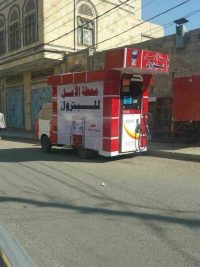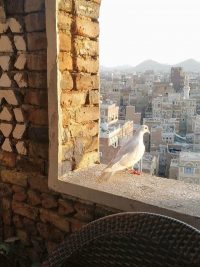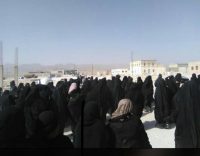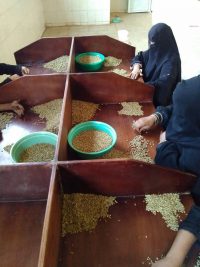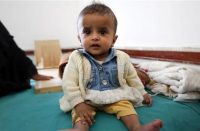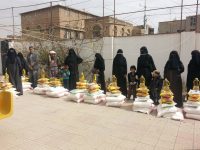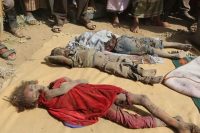Interview with Barbara Wally, published online in Blog http://www.jill-24-7.de/2018/02/22/jemen-katastrophe/
“At the time being Yemen is the worldwide worst location for a child” very recently pronounced Geert Cappelaere, UNICEF-Regional director in Yemen. The media report violence, famine, cholera, epidemics …
Yemen is among the child-rich countries in the Word – one more explanation why children are particularly affected in a war by now continuing for almost three years, a war in no way protecting civilians, provoking quite the contrary: since the war cannot be won by militia means, the civilians are held hostages and exposed to gradually progressing genocide. In most areas the Yemeni families with their great number of children are mercilessly exposed to food shortage and lack of water, expulsion, epidemic cholera and diphtheria, no medical services, landmines and bombarding.
Fighting in the streets has recommenced recently in Aden between the militia and militant separatists. In line with the rest of the country Aden suffers galloping inflation, a collapse in the exchange rate, and price rises by up to 400% for basic food. In general, food is available in sufficient quantity but the majority of the population cannot afford it. Daily life concentrates on obtaining the bare necessities, gasoline or gas are very often not available at all, supply of water and waste disposal function sporadically, and there are hardly any paid jobs. People live from hand to mouth. The country has been cut off from the outside world for more than two years, ports and airports have been closed.
In how far do funds contributed to major aid organizations for intended distribution reach the population? Recently a new aid program amounting to three million dollars had been decided by the UN for Yemen. About 13 million people should eventually have been provided with food. However, information leaked out in UN circles that the Houthis had jeopardised activities of more than 30 aid organizations (i.a. also the UN) by refusing permission to enter areas rebel-held by them?
Without sponsored money and the assistance of many international and national aid organizations hundred thousands of Yemenis would have fallen victims to hunger, thirst, illness, expulsion. In a humanitarian catastrophe of such dimension – with almost 20 million being afflicted, eight million thereof acutely – the activity of aid organizations becomes an undertaking involving billion amounts. Several thousand people are involved in the aid services rendered, including many Yemenis in situ. Numerous enterprises supply the goods paid for with the money sponsored. At this scale the production and supply of goods has become a branch of economic activity sui generis. In addition, the logistics of transport, storage and supply to the distribution sites must be carefully considered to assure that the aid reaches people dearly in need – this also in life-threatening war situations. The aid services more often than not manage to do so professionally and in the spirit of humanitarian ethos. Unfortunately, with complex services and the material thus offered, shortcomings cannot be avoided, i.e. deliberate supply of inferior material, above all in respect of medicinal products, additional expenses because of poor storage, unjust distribution, misuse, and the fact that the artificially created economy of scarcity opened the way for black markets and war profiteers. In some cases urgently needed products such as diesel (for hospitals and in agriculture) have been available on the black market only. Some aid organizations have turned to supplying those in need with cash (also artificially decimated by the occupation forces) to enable them to buy according to their need. The financial institutions, in turn, profit from the margin between official exchange rate and black market exchange rate, participating in a profitable transaction.
These facts defy any shading but the IGOS and NGOS perform miraculously well to mitigate the humanitarian catastrophe. Any further activities to protect the civil population over wide areas are hardly imaginable at the time being. There are, indeed, also local, long established aid organizations, familiar with overall conditions and special needs and in a position to offer efficient help, in particular for children and women. They are confronted with the difficulty of how to be sponsored with money from abroad. If possible they often help with enough six kinds of basic food for a family for one month.In a war not to be won by military combats other strategies are being applied to exert pressure and enforce succumbing. Poverty, hunger, vulnerability and powerlessness are used to demoralise, and even charity services have been increasingly utilised as strategic instruments.
In response to massive public pressure Saudi Arabia has promised sending aid to the amount of 1,5 billion US $ to Yemen but with the donation campaign not to be carried out by professional organizations. A special “Yemen Comprehensive Humanitarian Operation initiative” has been installed, a 100% Saudi company excluding all international organizations, operating in the entire Yemeni area in 17 corridors, starting in Marib which is under Saudi surveillance, charged with transporting aid products to the needy population. Saudi Arabia obviously intends to connect the promised aid with strategic interests in order to gain access to Houthi areas. It is also quite obvious that more money is spent on propaganda for this activity than for the very action as such.Understandably, the Houthis objected to the passage of the Saudi convoy with Saudi relief products in their areas – the past relationship had not been a confidential one at all.The ban on intervention of the international aid organizations´ contingent of relief supplies by the Houthis affetcs a precisely defined contingent of relief supplies:: “Houthis order health institutions under their control not to allow any program or move any aid by 36 INGs and local NGOs including UNICEF WFP Oxfam IOM without their approval and monitoring”.
This applies exclusively to health specific/medicinal goods and assistance. The orders communicated to Yemeni hospitals and outpatient clinics did not specify which products had to be examined but the wording implies that the supplies might contain unsuitable or noxious consignments as has happened before and in other areas (infested blood sacs, expired medicines). The Houthis might in all probability have been warned.
After Ali Abdallah Saleh´s death disaffiliations from the Houthis had been expected but this appears not to have become true. Did Saleh´s death influence the course of war?
Certainly Yes but not as expected. A spontaneous reaction was the closing down of the Russian embassy in Sana´a, one of the very few embassies still active throughout the war. Saleh had been in contact with this embassy, incorporating Russia´s interest into his post war plans, had i.a. intended to grant Russia an outpost in AlHodeidah. Russia had been annoyed about Iran´s failure to supervise Houthi activities and avoid Saleh´s assassination. Obviously, the Houthis and Russia do not share any points of communality.
Another item of importance for the future of the country is the fact that Saleh`s death strongly affected the support for maintaining the unity of the Yemeni state and strengthened secessionist forces, resulting in less resistance to a fragmentation of the country.
The withdrawal of the Saleh-fraction does not appear to have substantially impressed the Houthis. Quite on the contrary they appointed representatives of their Ansar-Allah-Party to hold important positions. How did this affect the population vis-à-vis the Houthis?
Those familiar with the situation had already expected that a Potemkin village will disappear with Saleh´s death on December 4th, 2017. The military forces of the Saleh fraction had, to a large extent, already been absorbed by the new military order established and supervised by the Houthis. As far as accountable only a small share of high ranking officers disengaged themselves. The Houthis detained a few thousand Saleh supporters after his death to prevent the coup he had prepared. With the exception of a few hundred of his closest companions they are out of prison in the meantime. Saleh must have greatly overestimated his support when he performed his U-turn all of a sudden and made advances to the Saudis. Similar to the military situation Saleh´s power in his party, the General People´s Congress Moutamar, had “crumbled”. The Moutamar had, from the very beginning, not been a party in the customary sense with a party program and share of power but had been exclusively directed at the leader Saleh and aligned towards creating a pseudo democratic apparatus for organising Saleh´s clientele. The Moutamar had split several times since the revolutionary events in the spring of 2011. The part remaining in Sana´a met after Saleh´s death to elect a new chairman, who subsequently pledged loyalty. However, other Moutamar groups also exist in Marib, Taiz, Aden and in the diaspora. The Moutamar mandates of their Superior Council and their provisional government, eliminated after Saleh´s death, were replaced without any problem by the Houthis. In matters of administration the Houthis prove much less professional than in military affairs and security. A considerable number of former Saleh official still hold positions in divers ministries.
How much influence has Hadi´s government on the political and military activities in the country still today? Have not the Saudis taken over since quite a while ago?
In respect of Hadi the internal opinion and the external view, in particular in reports about Yemen, differ extremely. Hadi´s legitimacy has become more than questionable since his stepping down in 2014, and is based on the formula “of the internationally acknowledge president”. A formula of importance for Saudi Arabia, since the Saudi government justifies attacking Yemen in order to re-establish the “legitimate” president. But also the USA, GB and Russia – at least vis-à-vis the external world and on paper stick to Hadi´s presidency he is exercising from his residence in Riyadh with more or less complied with decrees, nominations and discharges. On Yemeni territory Hadi is “persona non grata”, in the Houthi-area he is considered an enemy of the state and traitor since he has invited the Saudis to bombing the country, and in the South the Emirate occupation forces refuse to give him permission to land. Hadi is, furthermore, yet another object of dissent since, while he is considered a faithful vassal of the Saudis the Emirates tried right from the beginning to damage him since his followers mainly consist of Muslim Brothers. At the moment the Emirates endeavour to topple Hadi´s current government mission in Aden with the help of the STC (Southern Political Transition Council) they created, and their militia. Hadi has never been very popular, support for him as absent president has become very poor indeed, this also since he is accused of corruption and incompetence. But the more Hadi´s influence is weakened the more the question becomes acute what will become of the trillion of soldiers of the regular army in the absence of a leader? Will they become a militia misused by local and foreign interest groups for their purposes?
Saudi-Arabia and Jordan are among the best customers of German armaments concerns. Because of the not insignificant role German weapons play in the war in Yemen the deals should be stopped. – Is this a perception experienced three years late, or could this influence the course of the war?
The following war material of German origin delivered to the Saudi army is of importance for the civilian population: bombs of different sizes, at present produced by a Rheinmetall-subsidiary in Sardinia and delivered to Jeddah. In Saudi Arabia they are used to equip the planes releasing bombs onto Yemen. From March 2015 till the end of 2017 a total of 14.600 bombings occurred, causing horrible damage, with several thousand civilians, among them hundreds of children, falling victims. An embargo in respect of these bombs, also those from production sites outsourced abroad this humanitarian catastrophe could at least be mitigated. Furthermore, this applies to coastal petrol boats employed for blocking relief consignments in Yemeni ports. A strict delivery prohibition would be most helpful even now. Such embargos are no permanent solution, though, since Saudi Arabia is undertaking great efforts to establish an armament cluster of their own and will be self- sustaining in a foreseeable future.Most important in this situation would be a discussion to reflect the correlation between weapon supply, war events and the flow of refugees. Especially with a view to the high profits in the production of, and trade with, weapons I would plead to burden weapon exports in (potentially) war-making counties with extremely high taxes to be used – in accordance with the causative principles – for reconstruction of the country concerned on the one hand, and for the appropriate housing and support of refugees from war countries on the other.
Large areas in Yemen are (fortunately) not affected by acts of war, since the air strikes are mostly limited to Houthi areas – but how is the situation of the people in not affected areas?
Most acts of war are carried out in areas administered by the Houthis, primarily covering the northern mountains and adjoining areas, only making up for 20% of the surface of Yemen but representing 80% of the population since this is the part of the country with the most fertile and climatically pleasant zones. This explains why 80 % of the population are exposed to permanent acts of war, at the border areas and also at the coast even more than in the interior.Nevertheless, most statistics prepared by aid organizations show that also other, so-called free areas are suffering from extreme hardship, shortage of water and danger of pests. This is to be attributed also to the fact that the Saudi coalition after the breakdown of the military supremacy have started an economic war against the country, including a number of efficient strategies. One among these is an embargo on diesel which not only paralyzes energy supply for hospitals but also the water pumps which are indispensable for agriculture. Agricultural output has become less every year. Another strategy is withholding salaries of public servants including the military, and thus one third of family breadwinners, for many months. Teachers could no longer give lessons since they had to try to support their families with other jobs, schools had to be closed down. Then cash started to disappear successively and, even if goods were available in shops, they could not be paid for. Banknotes ordered and produced in Russia could not be distributed among the population since the planes had not been allowed to land by the Saudi coalition occupants for thirteen times running. Finally, the Yemeni currency was devalued at galloping speed. While shortly before the war only 215 Yemeni Ryals corresponded to one US $ now more than 400 Ryals are required. As a result of these factors and the blockades of food and medicines prices increased by up to 400%, while unemployment rose by 60%. Finally, Saudi Arabia deposited two billion $ in the national bank to stabilise the currency. Almost all Yemenis are afflicted by this development and the middle classes lapsed into poverty. On the other side war profiteers enjoy excellent business results on the black market with the constant shortage of gasoline.
The war has been going on for more than 1000 days, with almost 16.000 air strikes. 22 million Yemenites are considered in distress, eight million are acutely in danger of starvation. Even if the war ended tomorrow the consequences of this catastrophe would be perceptible for decades. Simultaneously three million babies were born during the war so far. Is this a certificate for the enormous capacity for suffering of the Yemenites, for their ability to still believe in a better future?
One could regards this in this way and cherish hope for the future. I tend to express a rather pessimistic point of view at the time being and ask myself how the world can watch how a wonderful country with wonderful people gets intentionally destroyed and undertake nothing. Why, for example, is there no UN mission for peace? Why do the so-called friends of Yemen stoke up the conflicts from outside the country instead of attempting a mediation?
With every further day of this war I fear the children will suffer more permanent harm resulting from malnutrition, illness and traumatisation, more every day this will affect their further lives, probably also that of their children – as we were infiltrated by the horror and the atrocities of World War Two (I belong to the post war generation). The Yemeni children will have fewer chances than other children growing up in peace. And I fear that the people in Yemen will not be able to return to their former way of life, their hospitality, their generosity, and vitality – after all the misery they are exposed to now.I closely follow the news every day, feel the helplessness and try to fight against it by engaging in small activities, writing about Yemen, telling others about the country and collaborating to assist the NGO YERO who is running a centre in Sana´a for helping children in need, making it possible for them to go to school and promoting them and supporting their families with small scale incomes and food donations.
- A Yemeni rarity: at this mobile gas station gasoline is „flogged“ at black market prices. Since the beginning of the war gasoline is in short supply everywhere, in a country with vast distances and without any public transport system. The price for gasoline on the black market has risen to umpteen times the amount before the war. This has become a major problems for transports of the aid organizations too..
- Women in the Eastern province of Mahra protested for many days against the presence of hundreds of Salafis, the Saudi occupants had „imported“ together with military equipment into the peaceful area at the Omani border. The Mahri-women so far achieved a Pyrrhus victory only. The Salafis were instructed to only stay at places specially assigned to them.
- Women in the area of Taizz sorting coffee beans for export. In this area fronts have hardened. The town is occupied by Salafi-militia and is surrounded by Houthi troops on the mountains. The women prepare the famous Yemeni coffee, obtaining top prices on the world market, under the prevailing conditions.
- One of the three million children born during the war. Will it for ever suffer from the consequences of malnutrition, epidemics, shortage of supply, expulsion and traumatisation or will it be able to contribute to the reconstruction of the devastated country? (Foto AFP)
- Distribution of food ratios to families in Sana´a by the NGO YERO ( Yemen Education & Relief Organization). One ratio supports a larger family for one month and consists of 5 – 10 bags of wheat, rice, millet, sugar, bean and also tea and oil. A just distribution is more easily accomplishes at small scale.
- 8th Oktober 2016, Hodeidah, Yemen: A Rheinmetall-bomb kills Hosni Ali Jaber, his wife and children while asleep (tweet Dietrich Klose)
